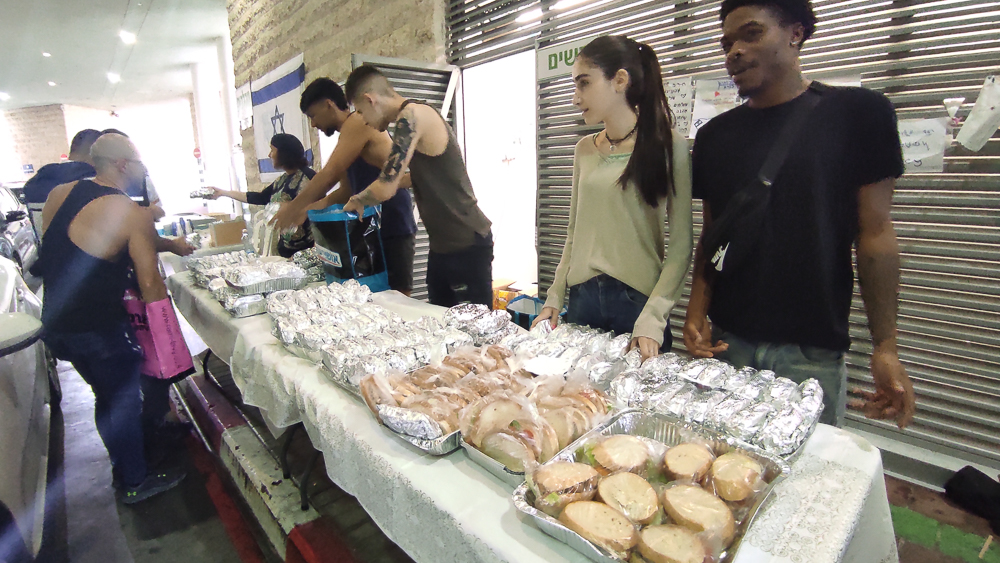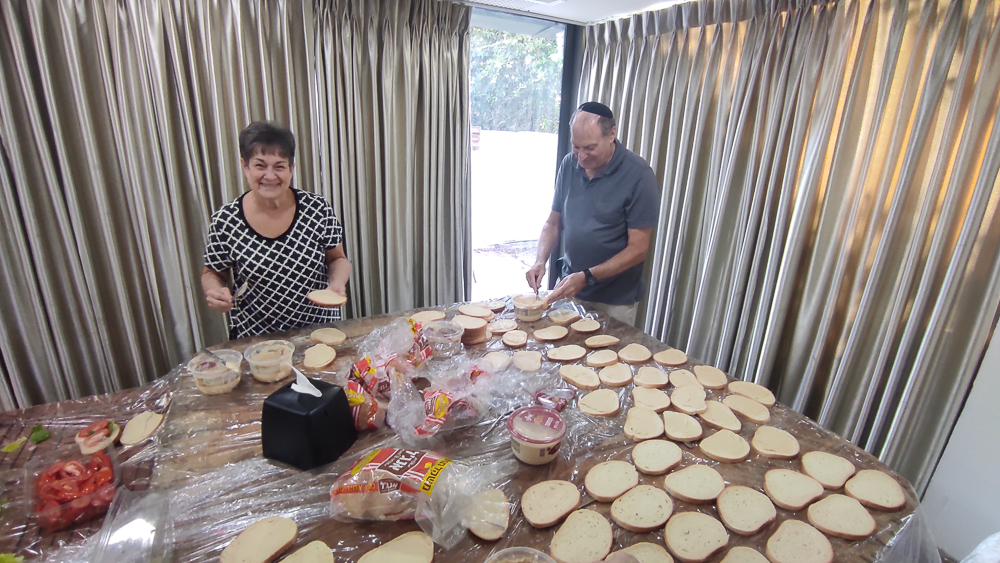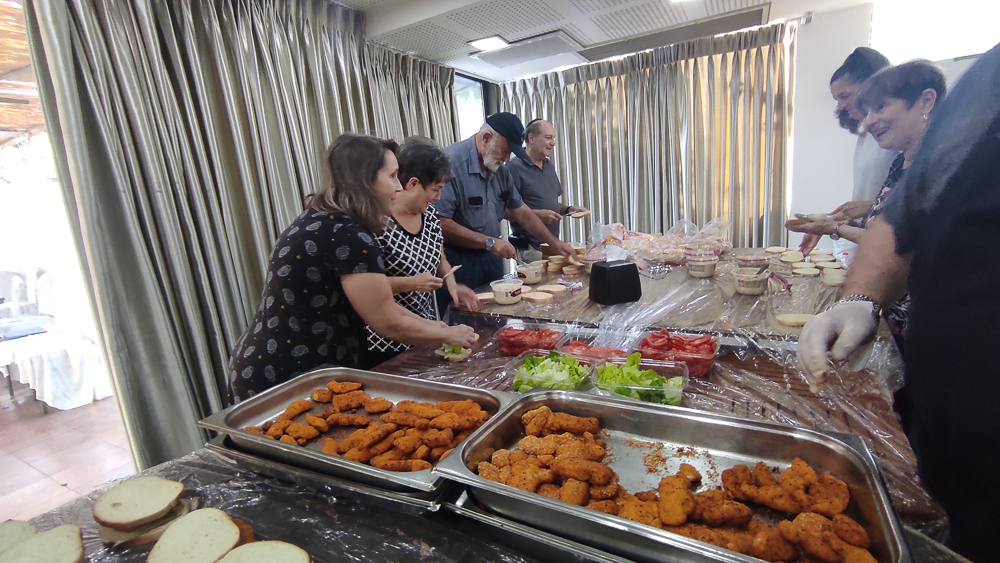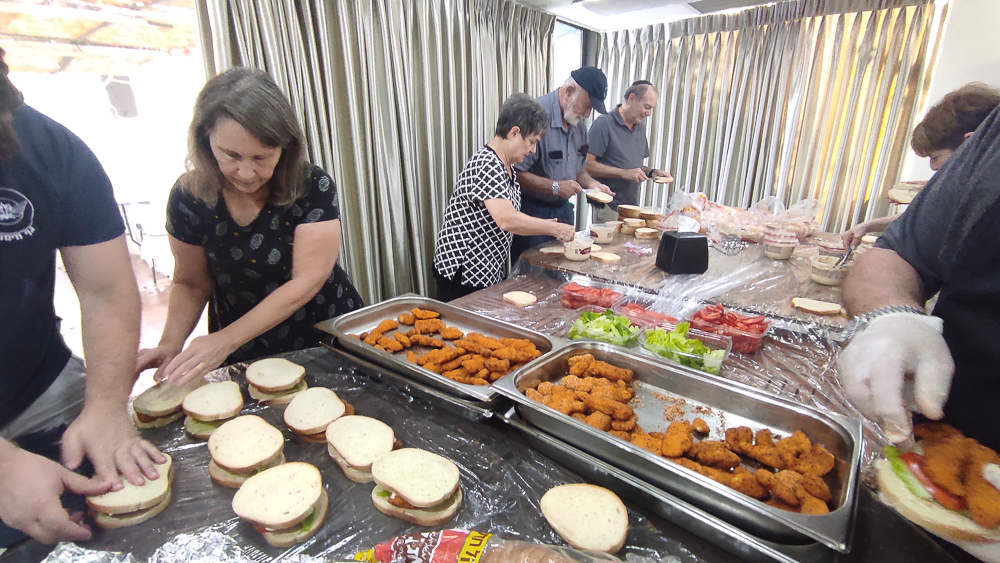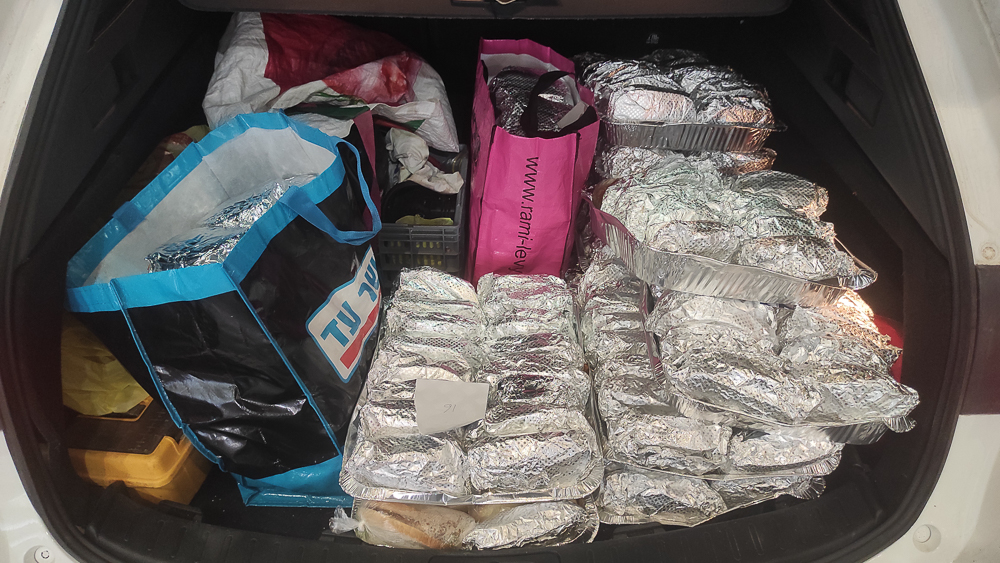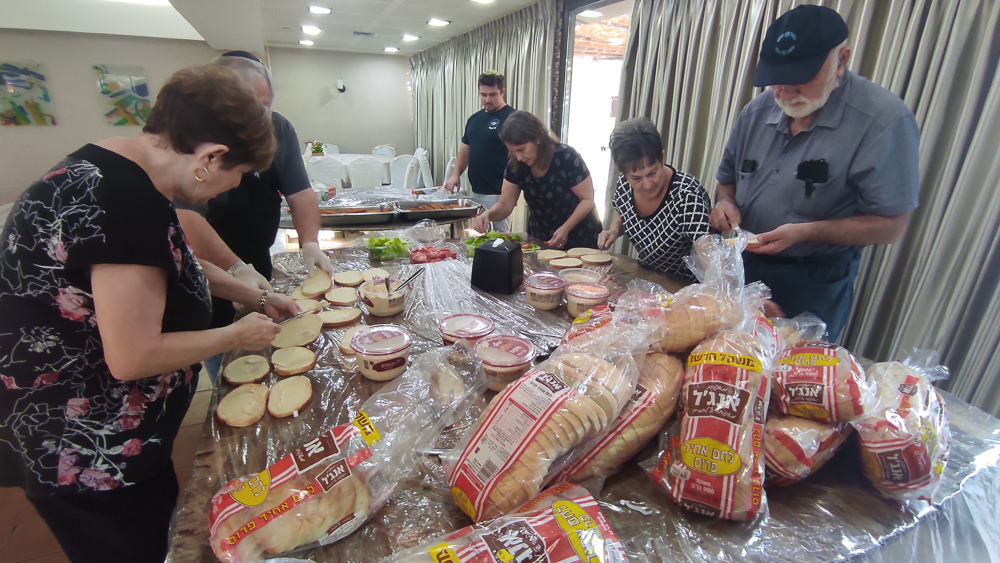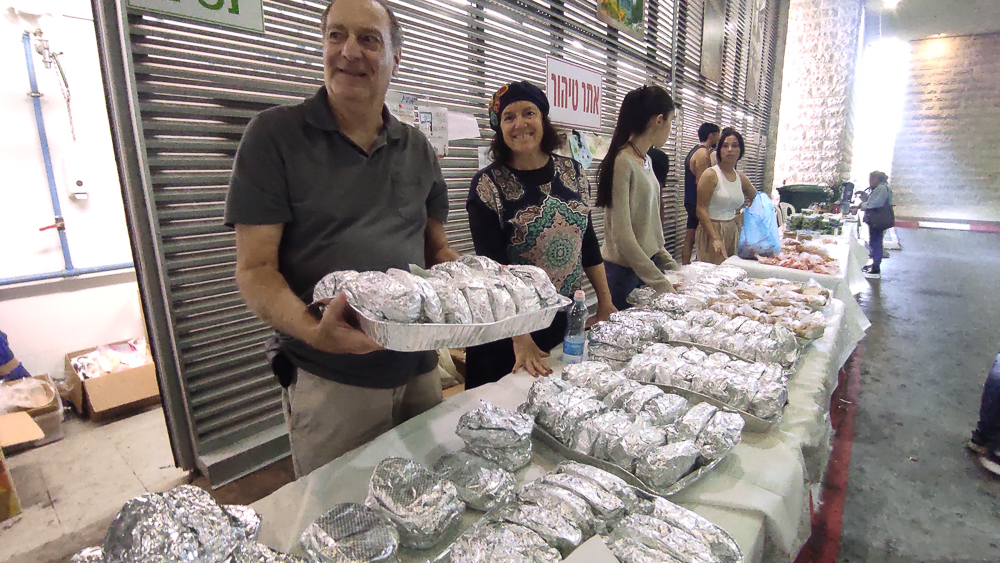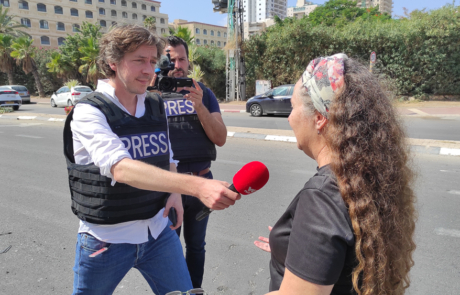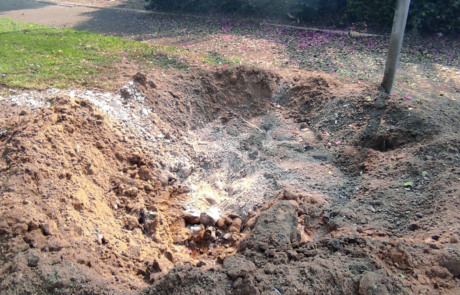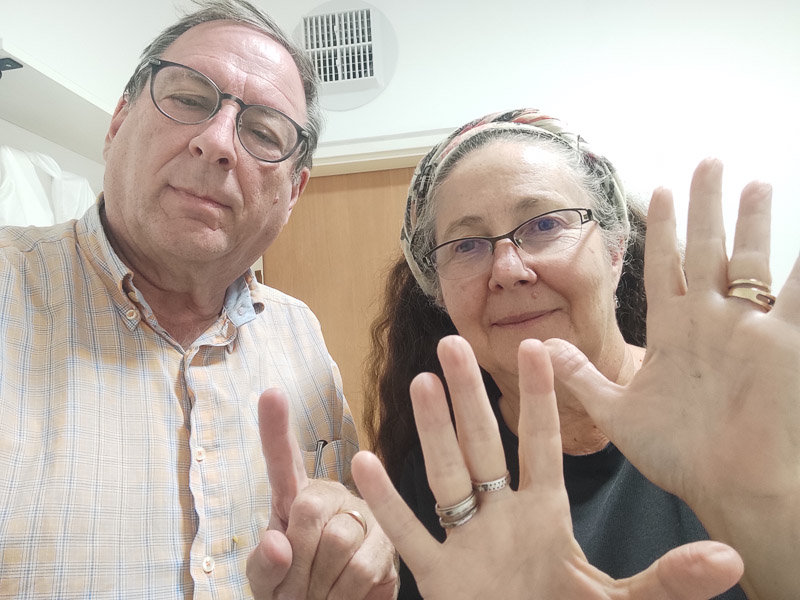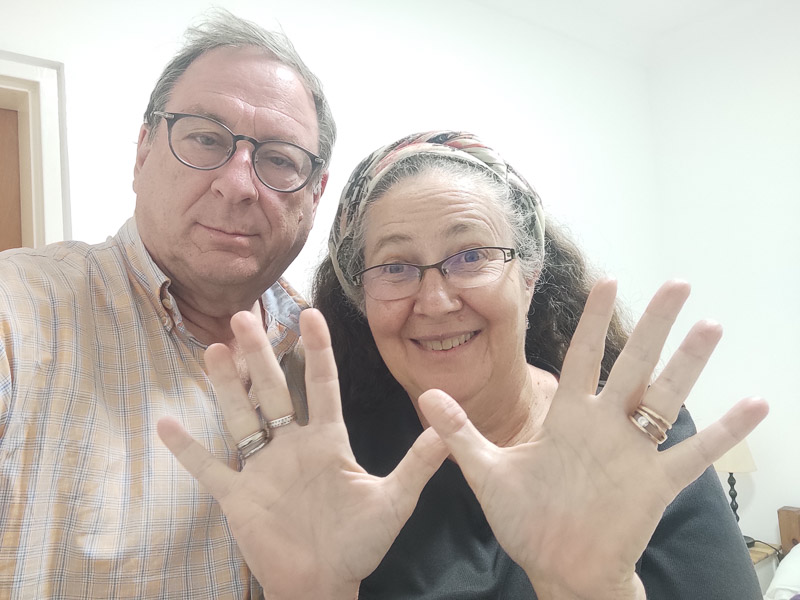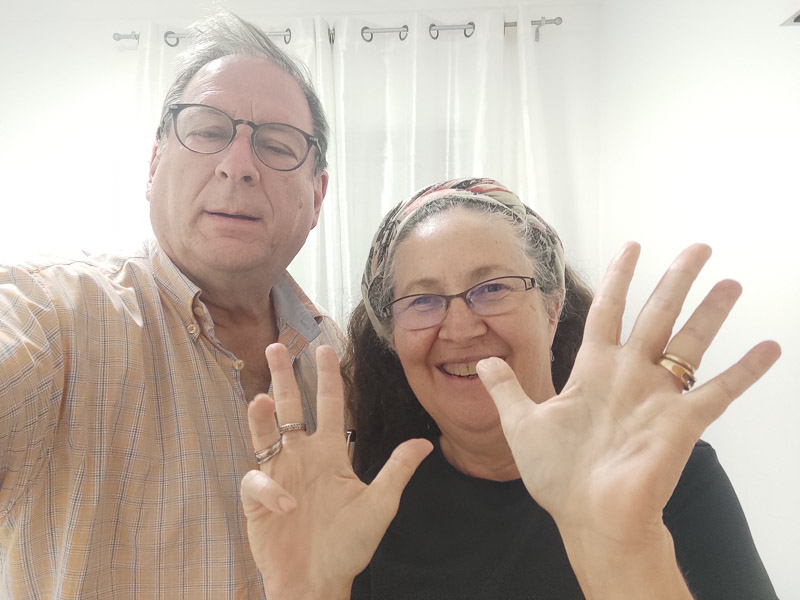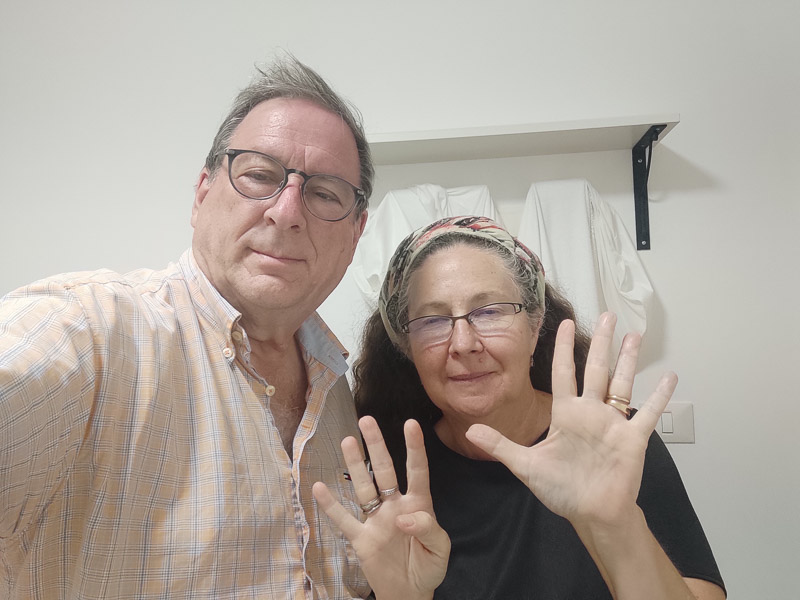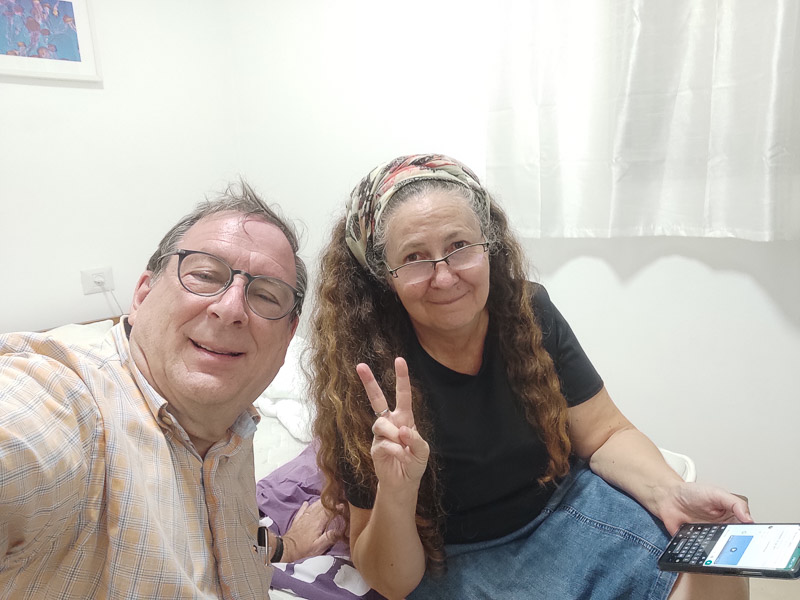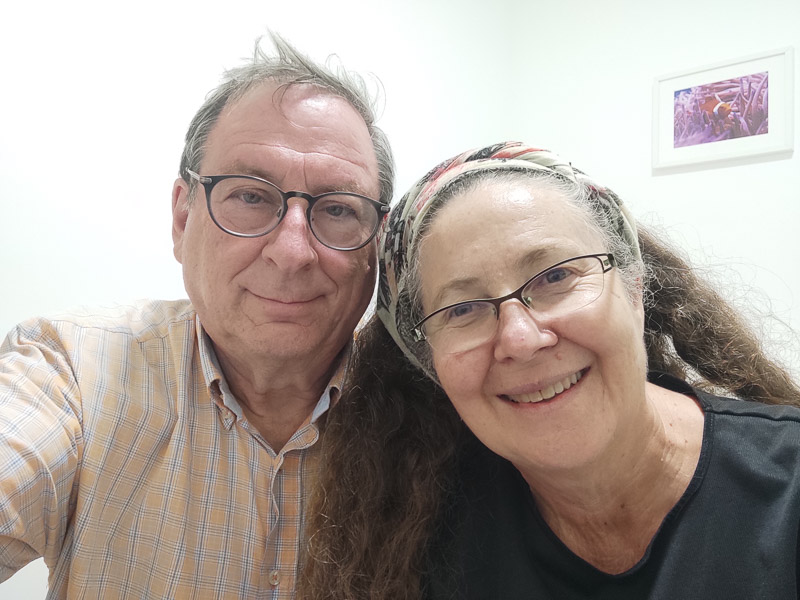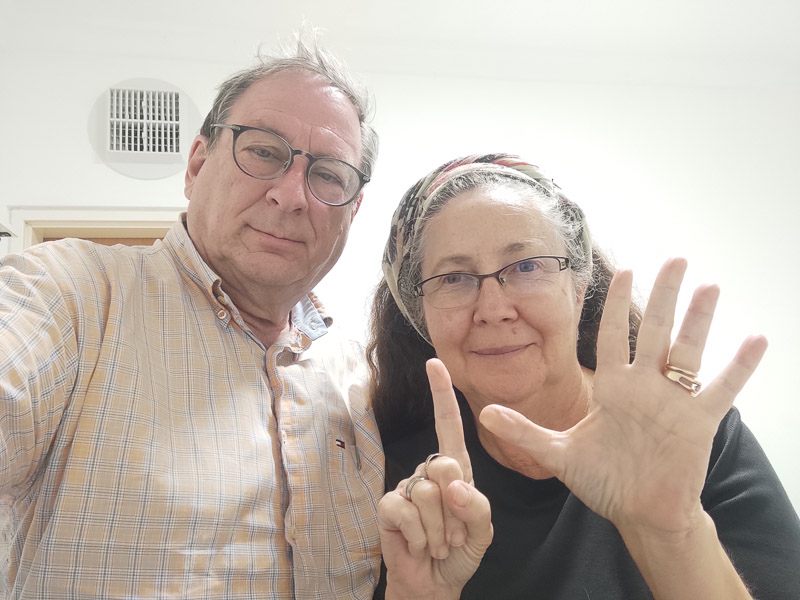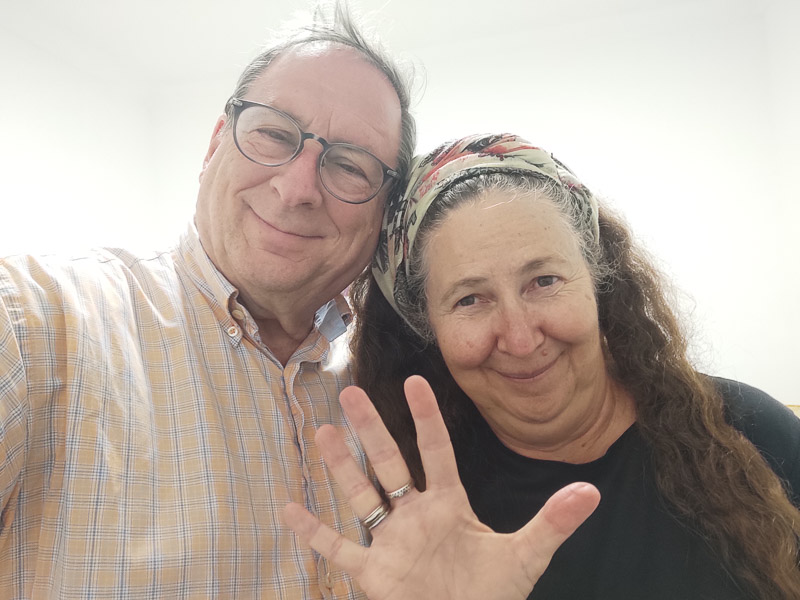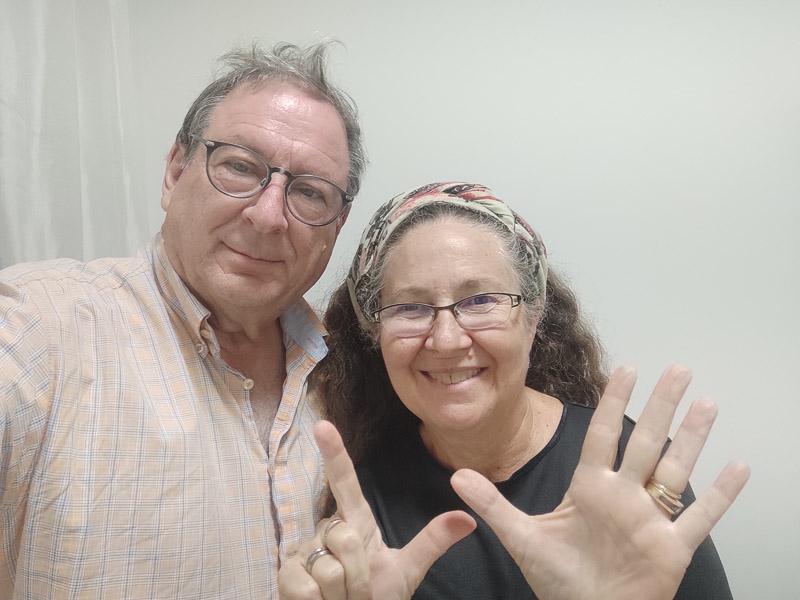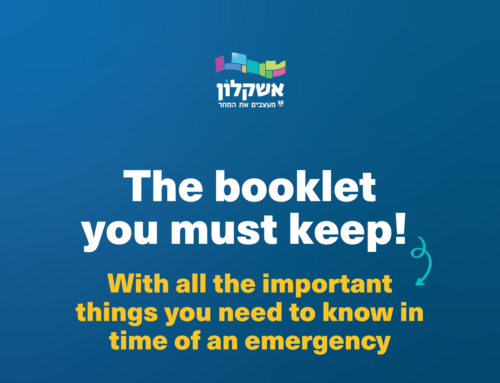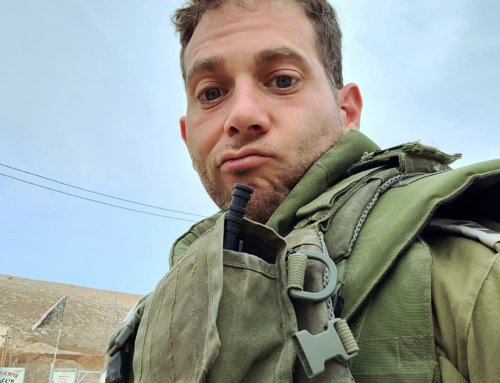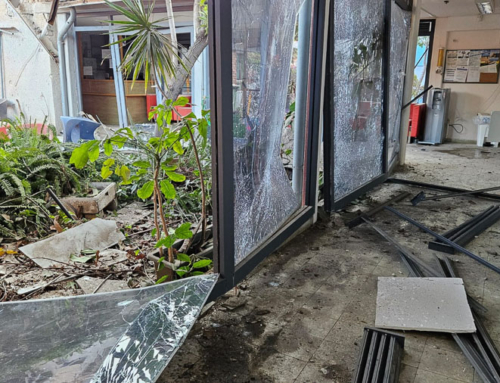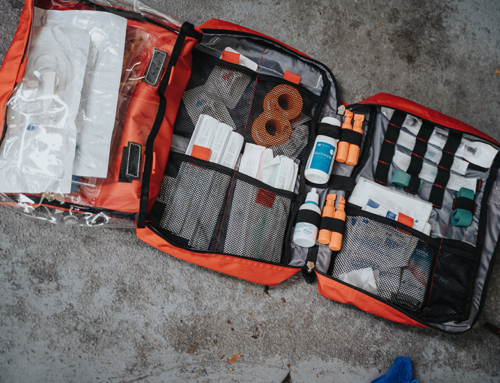By Stephen Epstein
Day 27 — Thursday, November 2, 2023
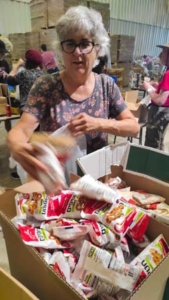 This morning, a minibus stopped in front of a building in Ashkelon and picked up 13 volunteers. We were joining other Sar-El volunteers on an army base near Be’er Sheva. Our task was simple. We were instructed to place packages of nuts, pretzels, energy bars (two of each type), candy and gum into a plastic bag. There were about 100 people working in group assembling these packages. Some people carried boxes of the snacks to the tables and emptied them into the boxes as they ran low. Other people assembled folding cartons and filled them with bags that had been filled. This worked like clockwork and thousands and thousands of bags were filled by the Sar-El volunteers. Sar-El has been working with volunteers for many years and the army relies on them in emergencies to help them, so soldiers can be focused on other tasks.
This morning, a minibus stopped in front of a building in Ashkelon and picked up 13 volunteers. We were joining other Sar-El volunteers on an army base near Be’er Sheva. Our task was simple. We were instructed to place packages of nuts, pretzels, energy bars (two of each type), candy and gum into a plastic bag. There were about 100 people working in group assembling these packages. Some people carried boxes of the snacks to the tables and emptied them into the boxes as they ran low. Other people assembled folding cartons and filled them with bags that had been filled. This worked like clockwork and thousands and thousands of bags were filled by the Sar-El volunteers. Sar-El has been working with volunteers for many years and the army relies on them in emergencies to help them, so soldiers can be focused on other tasks.
Before we tied up the bags, we put a little note inside that had a picture of a lion, symbol of Judah and Jerusalem, the capital of Israel and a chapter of Tehillim, Psalm 121.
A song for ascents.
I turn my eyes to the mountains;
from where will my help come?
My help comes from the LORD,
maker of heaven and earth.
He will not let your foot give way;
your guardian will not slumber;
See, the guardian of Israel
neither slumbers nor sleeps!
The LORD is your guardian,
the LORD is your protection
at your right hand.
By day the sun will not strike you,
nor the moon by night.
The LORD will guard you from all harm;
He will guard your life.
The LORD will guard your going and coming
now and forever.

Day 24 — Monday, October 30, 2023
We seem to hear less pounding of rockets and artillery today. There is very little news from Gaza, except that the IDF found proof of the death of two people who were taken by Hamas. Stories continue to come out about the last hours of some of the people who were killed by the Palestinian terrorists. Each story is worse than the next and it is hard to comprehend how people actually think that we can have a two-state solution.
Day 23 — Sunday, October 29, 2023
The day was spent in trying to catch up on different projects, while hearing the booms in the background. They were mostly our bombs and artillery hitting Gaza.
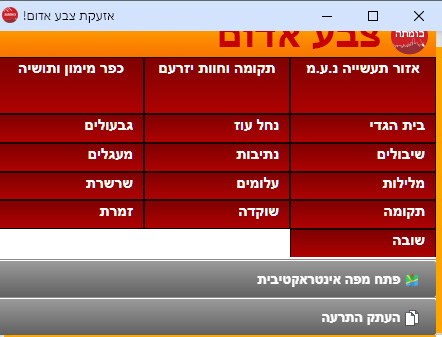 Alison signed us up for the evening shift at the hospital. Our tasks are filling the big urn with water, refilling water bottles with water from a dispenser in the hospital and adding raspberry concentrate. Alison made more tuna sandwiches, while G kept the hot water urn full.
Alison signed us up for the evening shift at the hospital. Our tasks are filling the big urn with water, refilling water bottles with water from a dispenser in the hospital and adding raspberry concentrate. Alison made more tuna sandwiches, while G kept the hot water urn full.
A few large Jeeps come into the emergency department with several army ambulances. Dozens of soldiers get out and accompany the patients on stretcher into the emergency department. This is just a drill.
As I sit and write about last night, I am again reminded of the rocket barrages that the Palestinian terrorists use to attack us. A popup appears on my computer and sounds an alarm. I use an extension that indicates which areas are receiving rocket fire. This was a large barrage, covering southern communities. Ashkelon, which has received about a quarter of all rockets aimed at Israel during this war, was spared. Indiscriminate fire into residential communities. This has been going on for years, but never at this pace or firepower. This war is different. We don’t want to keep on mowing the lawn, this time we want to remove Hamas completely. This is not easy to do and it is at great risk to our soldiers.
Day 22 — Shabbat, October 28, 2023
Alison writes:
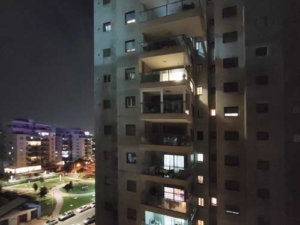 Right now, my neighborhood is quiet. But it was a noisy Shabbat. Not from grandkids or a bunch of guests. But from booms — theirs and ours.
Right now, my neighborhood is quiet. But it was a noisy Shabbat. Not from grandkids or a bunch of guests. But from booms — theirs and ours.Day 21 — Friday, October 27, 2023
As a Oleh to the country, I am at a disadvantage in trying to understand the culture of the country. It is hard enough to make my way through dealing with the cable company, bank, water company etc., but when it comes to the culture, I need an Israeli translator. A word or two I can look up or ask, but the cultural nuances are hard to understand. We tried watching the popular Israeli comedy show, Eretz Nehederet, and that helped us, but there are so many references on a daily basis that we are behind on. So I was nor surprised when my daughter, who is currently in green, said: “Abba, what do you think about this new mustache thing”? I didn’t know what she was talking about. She explained that it is a new “thing”, where soldiers are choosing to grow mustaches. She went on to explain that it has not reached her unit yet, but it is sweeping the combat soldiers, from one unit to the next. She says that many selfies that are being sent to friends and family show mustaches on them.
There are many articles on this trend and how it got started. Some attribute it to soldiers wanting to emulate the iconic picture of the liberators of the Jerusalem’s old city in the Six-Day War. Others claim that it because they want to appear like the men from Inglourious Basterds so they can become real macho. There is a dispute among units as to who actually started the trend.
A mother of a combat soldier shared comments from her son, a combat soldier who confirmed the trend among his unit: “Everyone in my unit said that if they get out of this war alive, they’re all going home and they’re going to have a baby, so expect a big baby boom after this.”
A lot of families are sending pics of themselves with mustaches for their soldiers who were called up. We decided to do the same.
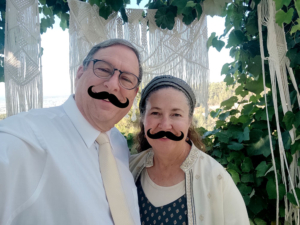
Day 20 — Thursday, October 26, 2023
Today started like any other day, except earlier. I spoke with a man who was in one of the southern communities affected by the terror attacks and subsequent shelling. 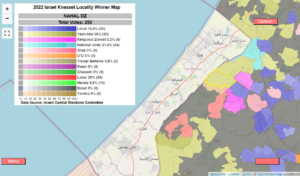 David told me about when they started to hear the alarms, he looked out and saw the terrorists approaching. He explained that never in his wildest dreams could he have imagined this scenario. I will not go into the details of the nightmare that his family went through until they were all safe.
David told me about when they started to hear the alarms, he looked out and saw the terrorists approaching. He explained that never in his wildest dreams could he have imagined this scenario. I will not go into the details of the nightmare that his family went through until they were all safe.
We had a chance to sit and talk together later in the day, and I was fascinated with his insights and perspectives on the war and on the the communities bordering Gaza.
I asked him what he thought was next.
David explained that the entire area around Gaza was filled with people who had hoped for peace. They believed that if they stretched out their hands, they would be met by other outstretched hands. He explained that almost all of these communities voted for left-leaning parties. I looked at a map of the Gaza communities, and what he said was correct, based the November 2022 election results. The yellow areas in the map indicated that the majority voted for Yair Lapid’s Yesh Atid (There is a Future) party. The orange was for Benny Gantz’s National Camp party.
David lives and works in the area and, over the past three weeks, has been trying to put together the many pieces of this massive puzzle. He explained that he and many of his friends and family feel like they were let down by their desire for peace by people who only wanted to kill. He added that it will be especially difficult for the younger generation, whose dreams have been shattered by the actions of October 7, to ever trust again. When I asked him about the future, he responded that if the IDF is successful in stopping Hamas from ever sending rockets again, there would be a flourishing of these communities, and people would flock to the region. If the army is unsuccessful, he was not very optimistic for the area. David also mentioned that he is looking forward to the day when he will be allowed to go back to his home with his family. But he said that in communities like Be’eri and Nahal Oz, he did not think many people would want to go back where so much bloodshed occurred.
His remarks reminded me of conversations I have had with Rwandans and Holocaust survivors, who went through events that very few people could imagine.
We parted ways, and I know that a man with his inner strength will continue in his path of doing good in Israel.
The country will need a commission of inquiry to pinpoint the people and processes that failed over the past two years of the planning this attack. There are so many people who will need to answer tough questions: Binyamin Netanyahu, the current prime minister; Yair Lapid, the former prime minister; Naftali Bennett, the prime minister before Lapid; Yoav Gallant, the defense minister; Herzi Halevi, the chief of staff; Benny Gantz, the former defense minister; the heads of the Shabak, Mossad and Military Intelligence… There are many people who are at the top of the pile, who will need to answer what they knew and when. Then the commission will need to to ask about the many reserve soldiers in intelligence and the pilots – those who were considered the cream of the crop – who refused to serve to the point that the army cried out and warned that we might not be prepared.
But now, we need to fight, not against each other. Now we need to unite to take out the terrorists who threaten our safe existence. There will be plenty of time after the war for finger-pointing and blame. Not now.
 Last week I saw a Facebook meme that disturbed me greatly. It showed photos of the leaders of the three Haredi parties. The title read: “Return the billions. We need them for the war.” The subtitle read: “On the [draft] evasion we will talk (when it is all over).” There are those who are are using our tragedy to focus on hatred of others. I have no words for people who choose to attack others, when we are under attack. I have no words for people who did not learn from the divisions that our country experienced even as recent as 21 days ago. (The anti-reform protest scheduled for the night of Oct. 7 had to cancelled after this nightmare from Gaza began.) Words like “civil war” were on the lips of some. God found a harsh way of uniting us. I wish it had been different.
Last week I saw a Facebook meme that disturbed me greatly. It showed photos of the leaders of the three Haredi parties. The title read: “Return the billions. We need them for the war.” The subtitle read: “On the [draft] evasion we will talk (when it is all over).” There are those who are are using our tragedy to focus on hatred of others. I have no words for people who choose to attack others, when we are under attack. I have no words for people who did not learn from the divisions that our country experienced even as recent as 21 days ago. (The anti-reform protest scheduled for the night of Oct. 7 had to cancelled after this nightmare from Gaza began.) Words like “civil war” were on the lips of some. God found a harsh way of uniting us. I wish it had been different.
Yesterday, while I was at the dentist, I sat in the waiting room and the woman beside me spoke to me: She asked in a critical tone: “Why do you wear your Tzitzit out”? I told her that I grew up in Canada and I never saw my father, who was subject to rabid anti-Semitism his whole life, wear a Kipah while walking on the street. Never. He always wore a hat or a cap, with a Kipah underneath. Only when he was in Israel did he proudly walk down the street with a Kipah on his head. I explained that I was home in our Jewish country and there was no reason to hide them in my pants. I assumed that she came to the conclusion that I was not a Haredi zealot since I worked and my kids served in the army; I guess I was OK in her mind.
We talked a bit more and she told me at great length about her late father, who never smoked on Shabbat and who was quite religious. She went on to tell me that she left that world as a young person and went off to a field to smoke on Shabbat. She made the decision to stop practicing and saw no reason why others had to sit and learn Torah as it were waste of time.
She then started to unleash against Haredim and called them “parasites” and other nasty names. She pressed me again and again on why Haredim had to sit and pray all day. I finally answered her that we need them to learn all day (not pray), because I was not able to do it, she was obviously not able to do it and the 72% of American Jewry who assimilate are not going to do it. My wife Alison came back at that point and asked her if she would be prepared to do the work that the largely Haredi ZAKA members are facing on a daily basis during this war…dealing with body parts of massacred bodies, burnt corpses and dismembered Israelis. She quietly said that she could not do what they are doing. She continued the conversation a bit longer, more muted and bit less pugnacious, maybe just a little bit more open to being united with the rest of the nation.
Day 19 — Wednesday, October 25, 2023
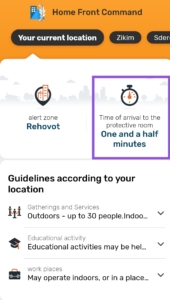 We had to leave Ashkelon to go to a dentist in Rehovot and a doctor in Rishon Lezion. As I was sitting in the waiting room, I took a look at my Home Front Command app and since it knows my location, it told me that instead of the 30 seconds we have to get into a shelter when there is a rocket attack, we have 90 seconds! I felt like I would not have to run to safety at the next rocket attack. This was pure luxury for us. When we got to Rishon LeZion, we were early for our appointment, so we decided to get a falafel. Alison and I started walking down the street and see people strolling, looking at store windows. It was hard for us to deal with the difference between our lives in Ashkelon, close to the action and life in the center, where they receive rockets a lot less frequently than Ashkelon.
We had to leave Ashkelon to go to a dentist in Rehovot and a doctor in Rishon Lezion. As I was sitting in the waiting room, I took a look at my Home Front Command app and since it knows my location, it told me that instead of the 30 seconds we have to get into a shelter when there is a rocket attack, we have 90 seconds! I felt like I would not have to run to safety at the next rocket attack. This was pure luxury for us. When we got to Rishon LeZion, we were early for our appointment, so we decided to get a falafel. Alison and I started walking down the street and see people strolling, looking at store windows. It was hard for us to deal with the difference between our lives in Ashkelon, close to the action and life in the center, where they receive rockets a lot less frequently than Ashkelon.
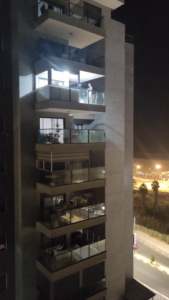 We got home and someone posted the warning for Otef Aza: stay indoors, close to a Mamad. We were expecting intense rocketfire tonight. We hunker down and were prepared for barrages of rockets. News reports say that we hit a particular street in Gaza with 25 bombs. This usually only happens when the army suspects there is an important target. We decide to take a break and go onto our Mirpeset for some fresh air and see something unusual. The apartment next to our apartment is very close. It reminds me of Hitchcock’s Rear Window, with Jimmy Stewart. We see on a Mirpset across from ours, a member of the media, doing a “report” from Ashkelon. She is wearing a bulletproof media vest and we are in our pajamas.
We got home and someone posted the warning for Otef Aza: stay indoors, close to a Mamad. We were expecting intense rocketfire tonight. We hunker down and were prepared for barrages of rockets. News reports say that we hit a particular street in Gaza with 25 bombs. This usually only happens when the army suspects there is an important target. We decide to take a break and go onto our Mirpeset for some fresh air and see something unusual. The apartment next to our apartment is very close. It reminds me of Hitchcock’s Rear Window, with Jimmy Stewart. We see on a Mirpset across from ours, a member of the media, doing a “report” from Ashkelon. She is wearing a bulletproof media vest and we are in our pajamas.
The media reports that people see are really performance pieces, trying to relay a message, but sometimes dressing it up in way that they think viewers want to see. If this reporter would do her report while wearing pajamas, like us, she would convey a totally different message. We waved to her when she finished her report.
This reminded me when I was covering Pope John Paul II’s visit to Toronto for a news agency. It was a hot summer day and reporter after reporter were wearing nice shirts and jackets and shorts, which were not seen by the cameras. This war, which is very real to people in Israel is seen around the world by people who want to show you something through their eyes. The problem is that many news outlets try and show a “balanced” view of the news. A popular meme, which has gone viral sums it up:
“JOURNALISM 101 If someone says it’s raining and another person says it is dry, it is NOT your job to quote them both. It’s your job to look out of the window and see which is the truth!!!”
I watch CNN and other news outlets and wonder what they would have done if they would have been around during WW2. Would they have gone to try and get the story from the side of the Germans? Very few people that I talk with have much respect for news outlets that equate the massacre, torture, rape and dismemberment of Israelis with the IDF’s response to eliminate Hamas.
Day 16 — Sunday, October 22, 2023
Today, we went shopping. Again. H and I went to a store in Migdal that is well stocked. The manager took us around and heled us compare prices. We need to the get the most out of our donations. While we were shopping, a rocket attack started and we followed the people in the store to a basement storage area.
After a few minutes we came out, resumed our shopping and checked out.
We finish our checkout and load the car with almost 3,000 NIS worth of food, including 200 cans of tuna.
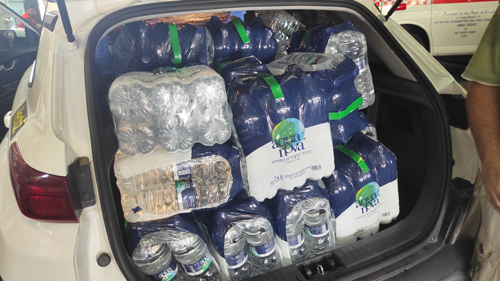
Day 15 — Shabbat, October 21, 2023
Day 14 — Friday, October 20, 2023
Today, we went shopping. We don’t know if the stores will have what we need. Everyone is waiting for the ground offensive to begin. The casualties will be brought to the Ashkelon hospital, because it is the closest to Ashkelon. Stock up….
We were in the checkout aisle of the supermarket when the rocket attack started. We made our way to a tiny Mamad at the back of the store, packed with people.
Day 13 — Thursday, October 19, 2023
Today we worked on organizing our efforts. Many years ago, I co-founded a Jewish humanitarian organization in Canada that dealt with providing relief to people in Toronto and around the world. Alison and I delivered earthquake relief to Turkey and we had multiple projects around the world. Today, we find ourselves being part of a team that is trying to make a difference in Ashkelon.
More rocket attacks, more runs to the Mamad.
Day 12 — Wednesday, October 18, 2023
We are exhausted, but can’t sleep. We head back to our apartment and start making arrangements for the day. Alison and I had work to do and I started a new writing project for a client. It is hard to keep focused on making a living, when there is so much to do for the war.
The first time that we made schnitzel they were appreciated by the staff. We decided to do it again, This time, we chose to centralize the production and packaging. The Ganei Shimshon Hotel is right next to the Central Synagogue of Afridar, Ashkelon’s largest Ashkenazi shul and the place where many English speakers daven. Bezalel is the owner and our experience of having a Shabbat Chatan there was amazing. I approached him and asked if we could use his ovens and set up in one of the banquet halls. Akiva, a retired chef told everyone what to do and created an assembly line. At one point we ran out of tin foil and tomatoes and he ran out to buy more. Howard has been one of the procurers of food that we use for sandwiches. With so many volunteers, we were able to get in and out and package about 225 schnitzel sandwiches.
Day 11 — Tuesday, October 17, 2023
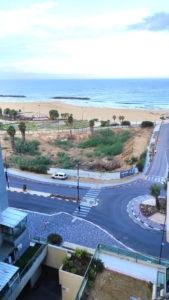 We woke up early, even though we are exhausted. The area of Ashkelon where we live did not have any attacks during the night. Last night and this morning I spoke with people making Aliyah to Ashkelon. They chose this beautiful city a long tome ago and despite the war, they have not changed their plans to make Aliyah to Ashkelon. Both have temporary accommodations. We found someone with an empty apartment, who is willing to let the Olah stay for free for a month. She had booked a BNB, but due to the war, they cancelled on her. The couple have a BNB and can stay longer in case they need it.
We woke up early, even though we are exhausted. The area of Ashkelon where we live did not have any attacks during the night. Last night and this morning I spoke with people making Aliyah to Ashkelon. They chose this beautiful city a long tome ago and despite the war, they have not changed their plans to make Aliyah to Ashkelon. Both have temporary accommodations. We found someone with an empty apartment, who is willing to let the Olah stay for free for a month. She had booked a BNB, but due to the war, they cancelled on her. The couple have a BNB and can stay longer in case they need it.
I have to do some work for clients and will start planning our day. Alison and I have a coffee and start planning. We step out to the Mirpeset (balcony) and take in the beautiful view of Ashkelon’s Delilah Beach. It is hard to imagine that we are at war. Not a single person on the beach and very few cars on the road. When we do see cars, they are speeding through the streets, trying to get to their destination before the next siren.
I turn on the TV and see a clip from last night. Geoff, one of the English speaking residents of Ashkelon is being interviewed by i24. Geoff, like so many other volunteers is giving his time during the war to fill in wherever needed. He was elsewhere in the country, but specifically came back to offer his assistance at this time of need. It is inspiring to see the dedication from people like Geoff, who risk the travel to the hospital, to make sure staff are fed. Geoff tells me: “Volunteering by helping to distribute food and meals to the medical staff, ambulance crews, and IDF personnel at Barzilai is an immensely rewarding way of giving them much-needed support. You are, in a small way, directly helping Israel with the work to win this horrific war but in a friendly environment with a great sense of camaraderie.”
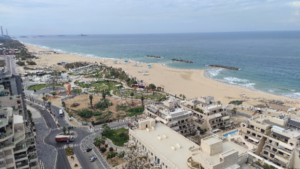 One of the things that I do is to manage properties for people who live outside of Ashkelon, but come here for summers or vacation. Many of them purchased hoping to retire here. Today I have to inspect two apartments for their insurance companies, to check to see if there are any leaks or damage to the apartments. I go out to the mirpeset to ensure the drains are clear. The rains will start soon and it is important that nothing interfere with the flow of water. I look at the sea and clean beaches and remember the last time Alison and I went for a swim. That seems like it was a long time ago. We were supposed to be in Spain this week for a vacation. I am reminded of the Yiddish expression, “Mann Tracht, Un Gott Lacht” — Man plans and God laughs.
One of the things that I do is to manage properties for people who live outside of Ashkelon, but come here for summers or vacation. Many of them purchased hoping to retire here. Today I have to inspect two apartments for their insurance companies, to check to see if there are any leaks or damage to the apartments. I go out to the mirpeset to ensure the drains are clear. The rains will start soon and it is important that nothing interfere with the flow of water. I look at the sea and clean beaches and remember the last time Alison and I went for a swim. That seems like it was a long time ago. We were supposed to be in Spain this week for a vacation. I am reminded of the Yiddish expression, “Mann Tracht, Un Gott Lacht” — Man plans and God laughs.
Both apartments are fine and I walk home. When I got there, our living room had another sandwich making crew. Because there are so many vegans in Israel, Alison and the crew made 40 vegan sandwiches, more than 60 schnitzel sandwiches and about 4o bags of cut vegetables for a snacks.
Many people ask, why we are volunteering to make sandwiches and manning the food tables outside the Emergency Department of the hospital. The hospital was damaged in two places, making getting around more difficult. They are maxed out with their expenses and every little thing that they can avoid spending money on, lets them do what they do best, which is to provide excellent medical care.
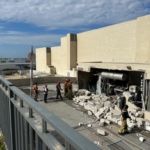
Photo by Jo Cooperman
I sit down to catch up and read online that a family in Jerusalem is sitting Shiva for one of the victims of Gaza. They need someone to handle the media, while they are in mourning. Alison and I, both former media people, make calls to see if we can find someone and ask some friends in Jerusalem to see if they can help.
While I am on the phone, we get another attack on Ashkelon and Alison and I go to the next room, which is our Mamad to sit it out until it is clear. Wash, rinse, repeat. It was a hit and Jo, a woman in our group, posts the damage.
Day 10 — Monday, October 16, 2023
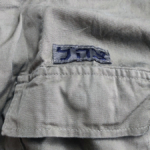 All the soldier’s laundry that we received was distributed last night and I Alison are going to return to our apartment to dry the laundry from last night. We are staying at an apartment two blocks from where we live, because it is very unlikely that it can be hit. It is beside another building and the rocket would have to come in at a specific angle in order to hit us. When people buy property, this is actually a calculation that some people make, especially if the apartment is not equipped with a Mamad
All the soldier’s laundry that we received was distributed last night and I Alison are going to return to our apartment to dry the laundry from last night. We are staying at an apartment two blocks from where we live, because it is very unlikely that it can be hit. It is beside another building and the rocket would have to come in at a specific angle in order to hit us. When people buy property, this is actually a calculation that some people make, especially if the apartment is not equipped with a Mamad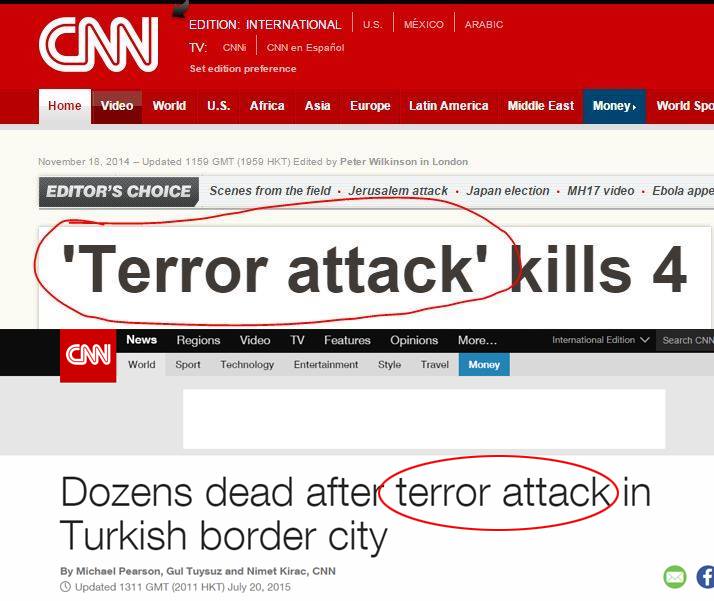 We get up, Alison has a cup of coffee and we have CNN on the background. Why don’t they call Hamas terrorists terrorists instead of militants? And when they do, it seems to be different than other terrorists. A number of years ago I started watching the subtle phrasing used by some news outlets and was shocked at how the message was often different when it came to Israel. In these two headlines of separate terror attack, CNN called one a terror attack and the other a ‘terror attack’, why the quote marks?
We get up, Alison has a cup of coffee and we have CNN on the background. Why don’t they call Hamas terrorists terrorists instead of militants? And when they do, it seems to be different than other terrorists. A number of years ago I started watching the subtle phrasing used by some news outlets and was shocked at how the message was often different when it came to Israel. In these two headlines of separate terror attack, CNN called one a terror attack and the other a ‘terror attack’, why the quote marks?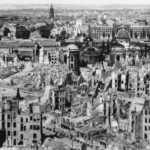
In four raids between 13 and 15 February 1945, 772 heavy bombers of the Royal Air Force (RAF) and 527 of the United States Army Air Forces (USAAF) dropped more than 3,900 tons of high-explosive bombs and incendiary devices on the city. The bombing and the resulting firestorm destroyed more than 1,600 acres (6.5 km2) of the city center.[3] Up to 25,000 people were killed. Three more USAAF air raids followed, two occurring on 2 March aimed at the city’s railway marshalling yard and one smaller raid on 17 April aimed at industrial areas.
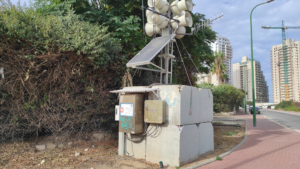 The trip between apartments is stressful. We are not carrying much, but we have to be protected against possible rocket attacks, while walking the dog to ensure that she relieves herself. We exit the building and discuss which side of the street we should walk on. One side is more built up and offers little nooks and crannies to lie down in should a rocket be launched. We decide that we will start on the side with more shelter, then cross over to side with the grass, where our dog can go. Alison says, if the siren starts, we should head for the big concrete blocks that hold our neighborhood siren. We discuss which side would offer better protection, almost as if we were studying Gemara. Alison feels the south side, because there is a fence and bushes there, I think the north side, because rocket shrapnel will not be stopped by a chain link fence and bushes. The discussion did not matter, we make it to the road and enter our complex through the above ground parking. which offers many choices of entrances, each with their own Miklat in the basement. A Miklat is a bomb shelter that all apartment buildings used to have. After the gulf war, the need was for shelters that could withstand gas attacks and since gas would sink to lower levels, an underground shelter was less desirable. Now, every new apartment is equipped with a Mamad, which is a room with very thick concrete walls and heavy metal plate window closures and door.
The trip between apartments is stressful. We are not carrying much, but we have to be protected against possible rocket attacks, while walking the dog to ensure that she relieves herself. We exit the building and discuss which side of the street we should walk on. One side is more built up and offers little nooks and crannies to lie down in should a rocket be launched. We decide that we will start on the side with more shelter, then cross over to side with the grass, where our dog can go. Alison says, if the siren starts, we should head for the big concrete blocks that hold our neighborhood siren. We discuss which side would offer better protection, almost as if we were studying Gemara. Alison feels the south side, because there is a fence and bushes there, I think the north side, because rocket shrapnel will not be stopped by a chain link fence and bushes. The discussion did not matter, we make it to the road and enter our complex through the above ground parking. which offers many choices of entrances, each with their own Miklat in the basement. A Miklat is a bomb shelter that all apartment buildings used to have. After the gulf war, the need was for shelters that could withstand gas attacks and since gas would sink to lower levels, an underground shelter was less desirable. Now, every new apartment is equipped with a Mamad, which is a room with very thick concrete walls and heavy metal plate window closures and door.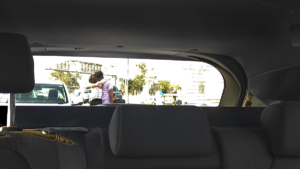 We sit in our car. Every scene here is heartbreaking. We are watching one drop off after another. Girlfriends hugging their soldiers. The couple we see in our rear view mirror don’t want to let go of each other… one last kiss, another caress of a face, one more hug. These are the scenes of couples who are saying goodbye, not knowing if they will see each other again. It is natural for every person to worry if this will be the last time we see each other. The scene is repeated again and again. Going into Gaza means snipers, tunnel with boobytraps and secret entrances. Gaza’s tunnel are a labyrinth under the city, with surprises for even our best-trained soldiers.
We sit in our car. Every scene here is heartbreaking. We are watching one drop off after another. Girlfriends hugging their soldiers. The couple we see in our rear view mirror don’t want to let go of each other… one last kiss, another caress of a face, one more hug. These are the scenes of couples who are saying goodbye, not knowing if they will see each other again. It is natural for every person to worry if this will be the last time we see each other. The scene is repeated again and again. Going into Gaza means snipers, tunnel with boobytraps and secret entrances. Gaza’s tunnel are a labyrinth under the city, with surprises for even our best-trained soldiers.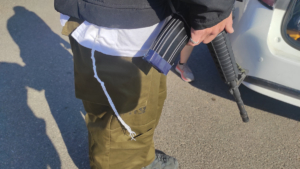 B arrives and he is wearing Tzitzit. In this conflict thousands and thousands of soldiers are wearing Tzitzit. Tzitzit are specially knotted ritual fringes, or tassels, worn in antiquity by Israelites and today by observant Jews. Tzitzit are attached to the four corners of the tallit gadol (prayer shawl), usually referred to simply as a tallit or tallis; and tallit katan (everyday undershirt).
B arrives and he is wearing Tzitzit. In this conflict thousands and thousands of soldiers are wearing Tzitzit. Tzitzit are specially knotted ritual fringes, or tassels, worn in antiquity by Israelites and today by observant Jews. Tzitzit are attached to the four corners of the tallit gadol (prayer shawl), usually referred to simply as a tallit or tallis; and tallit katan (everyday undershirt).
There are two sources in the Torah for Tzitit.
And Hashem said to Moshe saying: Speak to the sons of Israel and say to them [that they must] make for themselves tzitzit upon the corners of the clothes for generations, and on the tzitzit give a string of techelet. And they shall have for themselves tzitzit and they will see them and they will remember all of the commandments of Hashem and they will do them, and they will not stray after their hearts and eyes so that they shall not pursue after them. So that they will remember and adhere to all of my commandments and will remain holy to their God. I am Hashem your God who took you out of the land of Egypt to be for you a God. I am Hashem your God.
— Numbers 15:37-41
You shall make tassels on the four corners of the garment with which you cover yourself.
— Deuteronomy 22:12
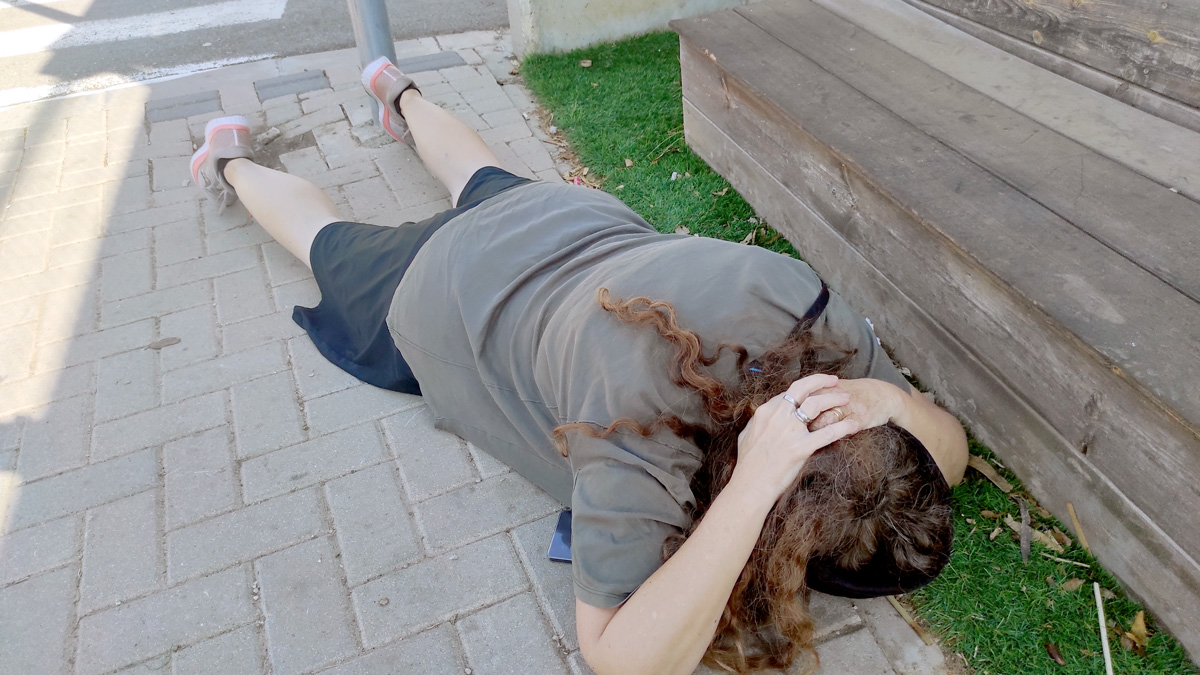 The soldiers take their laundry, more hugs and goodbyes, and they walk back to the base. We dry our eyes and start the car. The car does not start. It happens when we are try and start the car before entering the security code. We have to wait a few minutes to try again. Another siren and we are just outside a huge army based filled with armaments and explosives. We run and scan the area where to find protection. I yell to Alison to lie down beside the wall just ahead, she says, to follow the soldiers. We did and entered the base with the other soldiers in the parking lot and quickly hit the ground next to a block wall. The Home Front Command instructions are to lie as flat as possible on your stomach and to clasp your hands around your head. Shrapnel tends to do more harm is you are standing or crouching. The wall will help prevent damage if it hits from that side. Israelis say that a rocket “falls”, but in English we talk about “hits”.
The soldiers take their laundry, more hugs and goodbyes, and they walk back to the base. We dry our eyes and start the car. The car does not start. It happens when we are try and start the car before entering the security code. We have to wait a few minutes to try again. Another siren and we are just outside a huge army based filled with armaments and explosives. We run and scan the area where to find protection. I yell to Alison to lie down beside the wall just ahead, she says, to follow the soldiers. We did and entered the base with the other soldiers in the parking lot and quickly hit the ground next to a block wall. The Home Front Command instructions are to lie as flat as possible on your stomach and to clasp your hands around your head. Shrapnel tends to do more harm is you are standing or crouching. The wall will help prevent damage if it hits from that side. Israelis say that a rocket “falls”, but in English we talk about “hits”.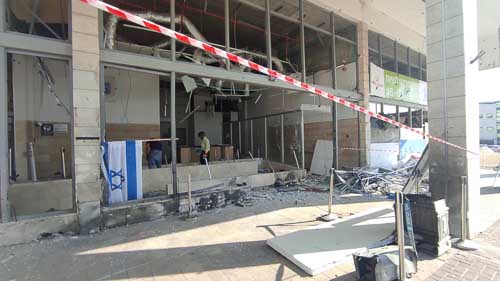 Our drive to Ashkelon was quiet and we drive through town and see the devastation of the rockets that got through. A government office had a hit on the sidewalk in front of the office. There guard tells me that it happened on Shabbat, and was thankful that it was not during the week when the very spot has dozens of people lined up outside on the sidewalk, waiting to enter the office.
Our drive to Ashkelon was quiet and we drive through town and see the devastation of the rockets that got through. A government office had a hit on the sidewalk in front of the office. There guard tells me that it happened on Shabbat, and was thankful that it was not during the week when the very spot has dozens of people lined up outside on the sidewalk, waiting to enter the office.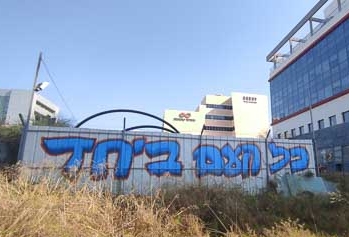
We drive down one of the main streets and see a wall painted with graffiti, but not the type that you would expect in Tel Aviv, but a huge wall painted with the words: Kol HaAm Beyachad (the whole nation is united). This is an understatement. It was less than a month ago that there were demonstrations and counter-demonstrations regarding the proposed judicial reforms. The country was torn apart, like I have never seen before. There were arrests, violence and the talk of civil war was on the lips of many. On October 7 EVERYTHING changed. There was no right, no left. No distinctions between people. We were all united.
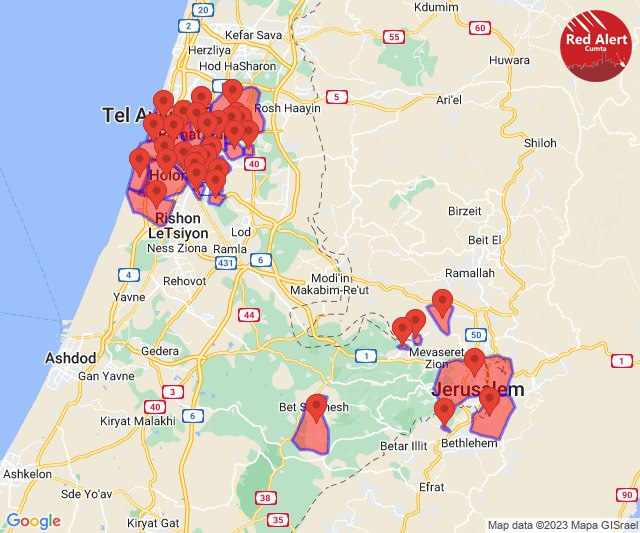
Day 9 — Sunday, October 15, 2023
We have been helping the volunteers at Barzilai hospital man the food tables and to prepare meals.
Today our Ashkelon English speaking group really pulled off an amazing accomplishment. Yesterday, someone mentioned that many people are looking for MEAT when they come out. So a group of people said, if they want schnitzel, schniztel is what we will provide!
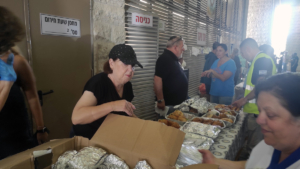 Howard sourced 40 packages of frozen schnitzel and foil pans. We had lechmaniyot from the hospital that were not being used as well as pitot. Ready made kits were sent out to volunteers with these raw materials. Then, Janet, Heather, Shulamit, Hannah, Julie, Bella and Alison cooked the schnitzel, made the sandwiches and wrapped them in foil. Then they were delivered to the hospital, where Akiva, Leah, Howard Brown Barbara and Cheryl helped provide HUNDREDS of schnitzel sandwiches to staff. They were snapped up immediately and very much appreciated by everyone (except vegans).
Howard sourced 40 packages of frozen schnitzel and foil pans. We had lechmaniyot from the hospital that were not being used as well as pitot. Ready made kits were sent out to volunteers with these raw materials. Then, Janet, Heather, Shulamit, Hannah, Julie, Bella and Alison cooked the schnitzel, made the sandwiches and wrapped them in foil. Then they were delivered to the hospital, where Akiva, Leah, Howard Brown Barbara and Cheryl helped provide HUNDREDS of schnitzel sandwiches to staff. They were snapped up immediately and very much appreciated by everyone (except vegans).
We can’t do this everyday, because it cost over 2,000 NIS and we don’t have the money to repeat it daily. Maybe this is a special meal that we can do once a week.
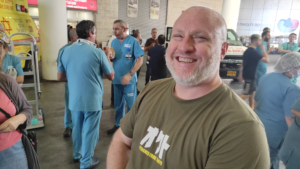 David Cohen is a Canadian, living in Ashkelon. He was only here a short time when he stepped into the role of organizing the food tables outside the emergency department at Ashkelon’s Barzilai hospital. David reports, “The meals that we put together feed the admin staff, the nurses the doctors, security, maintenance that supports the ER, soldiers and police that come through and occasionally their families. So, on a slow day, we are servicing around 600 people and on a busy day, we’re servicing about one thousand people. And then there are some of the employees that are working around the clock that don’t have family, so they take some of that food home, not a lot but enough to add to the numbers.”
David Cohen is a Canadian, living in Ashkelon. He was only here a short time when he stepped into the role of organizing the food tables outside the emergency department at Ashkelon’s Barzilai hospital. David reports, “The meals that we put together feed the admin staff, the nurses the doctors, security, maintenance that supports the ER, soldiers and police that come through and occasionally their families. So, on a slow day, we are servicing around 600 people and on a busy day, we’re servicing about one thousand people. And then there are some of the employees that are working around the clock that don’t have family, so they take some of that food home, not a lot but enough to add to the numbers.”
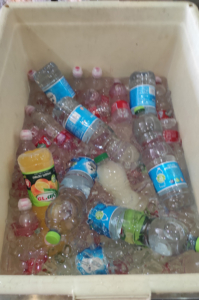 There has been an urgent call for water. As each ambulance crew comes in, that is an opportunity to grab a sandwich or water. We have had lots of juice, but many have been asking for water. Last week, David Zwebner drove in with 1,800 bottles of water…they were grabbed quickly. Today, we brought 24 bottles and I saw that someone brought a lot of small bottles. The small ones are preferred by people on the go, like ambulance staff. But everyone want it cold. We have one fridge, which is not nearly enough to hold everything, so two big bins on wheels are filled with water and ice is dumped in. Not perfect, but it does the job.
There has been an urgent call for water. As each ambulance crew comes in, that is an opportunity to grab a sandwich or water. We have had lots of juice, but many have been asking for water. Last week, David Zwebner drove in with 1,800 bottles of water…they were grabbed quickly. Today, we brought 24 bottles and I saw that someone brought a lot of small bottles. The small ones are preferred by people on the go, like ambulance staff. But everyone want it cold. We have one fridge, which is not nearly enough to hold everything, so two big bins on wheels are filled with water and ice is dumped in. Not perfect, but it does the job.
We have an amazing group of dedicated people in our community! It is not time to pat ourselves on the back (I hope we can all get together after the war). There is a lot more coming and we will see more sadness as our soldiers enter Gaza. We need to keep the hospital going and use the skills that we have.
It rained in Ashkelon overnight, which is not great weather for a ground invasion. There are reports that it is postponed, but the saying that “The first casualty of War is Truth”. There is so much information floating about. With instant communications, we have no way of knowing if a post on Facebook is correct or not. I won’t repeat these posts and memes. Sometimes there are long arguments between people about the veracity of a request. Last week a popular video clip went out explaining all the things that soldiers need and to please donate them. We went to a local hardware store and bought a ton of stuff. We then dropped it off at a gathering point. On Friday, I met a brigadier general at the hospital and he told us to stop buying this stuff and sending it to bases. He said most bases no longer need it and they have to get rid of some of the stuff. That same video is still being posted. There are so many organizations that need help and people do not know where to donate. So, a friend of mine put together a list on a website https://support4israel.com/ I do some work with Zaka and am very impressed with the work that these angel do. They have the work of dealing with the many bodies, some in very bad shape. Another great organization that will be needed soon is Beit Halochem. They deal with disabled vets and there are people who need help NOW.
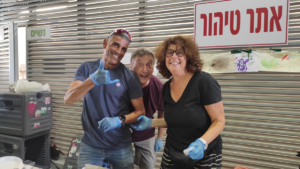 Many of the bases have all the food that they need, but we just received a call from H that B, and other soldiers, need their clothes washed. Sometimes it is the little things that you take for granted that are important. All the soldiers that have been called up are busy and they do not have the time to do laundry. The call went out to people in our WhatsApp group to see who can do laundry for these soldiers and immediately messages started coming in to offer help. This is what life is like in Ashkelon. There are a lot of really amazing people here who give of their time and from their pockets as well.
Many of the bases have all the food that they need, but we just received a call from H that B, and other soldiers, need their clothes washed. Sometimes it is the little things that you take for granted that are important. All the soldiers that have been called up are busy and they do not have the time to do laundry. The call went out to people in our WhatsApp group to see who can do laundry for these soldiers and immediately messages started coming in to offer help. This is what life is like in Ashkelon. There are a lot of really amazing people here who give of their time and from their pockets as well.
We started our WhatsApp group about three years ago. There were many small groups in the city, but we felt that Ashkelon Anglos needed a central place for sharing information. The group is the largest and fastest growing group for Anglos in Ashkelon and has now grown to over 250 people. During a war or skirmish, the group acts as the extended family of members. It is how we share information in good time sand sad times.
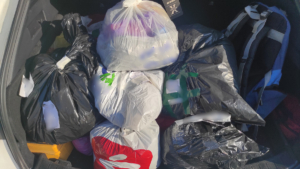 We drive to the base and there are cars everywhere. They are parked in every available piece of land. I noticed that a vehicle has sheets of cardboard covering the tires. Sometime car owners do that to protect their tires from sun damage. This tells me that the owner expects to be away for a long time. We make our way to a lot, where we wait. B comes out with a friend, carrying a backpack with laundry and the two of them are carrying bags, each one with the name and phone number. B has an M4 strapped to his back. This is my soft spoken son-in-law, who loves to read and hike. He always has a smile on his face and now, he is getting ready to defend our country. He just got married and in the Torah, the law was to not send men to war their first year after they were married. This is a Milchemet Chova, an obligatory war. There are no grace periods for newly weds. This brave young man goes willingly.
We drive to the base and there are cars everywhere. They are parked in every available piece of land. I noticed that a vehicle has sheets of cardboard covering the tires. Sometime car owners do that to protect their tires from sun damage. This tells me that the owner expects to be away for a long time. We make our way to a lot, where we wait. B comes out with a friend, carrying a backpack with laundry and the two of them are carrying bags, each one with the name and phone number. B has an M4 strapped to his back. This is my soft spoken son-in-law, who loves to read and hike. He always has a smile on his face and now, he is getting ready to defend our country. He just got married and in the Torah, the law was to not send men to war their first year after they were married. This is a Milchemet Chova, an obligatory war. There are no grace periods for newly weds. This brave young man goes willingly.
We saw a video (https://fb.watch/nBqA-h_mN4/) of couple who were supposed to be married last week, the fourth day of the war. They cancelled the wedding, the caterer, the hall, band and photographer and had the wedding on the groom’s army base. The guests were the immediate family and lots and lots of soldiers. Life goes on. Another video of a soldier who recited the brachot for his son’s brit milah on base, via Zoom. Life goes on whether we like it or not.
We say our goodbyes. I feel like crying, but don’t want him to see my tears. Alison and I take a group selfie to send to H. We hug and kiss him and leave back to Ashkelon with a trunk full of dirty clothes.
Day 8 — Shabbat, October 14, 2023
We spent a lot of time in our Mamad preparing for the next stage. Much of our life while we are pinned down revolves around our virtual community on our Anglo Community WhatsApp group. It is the largest and fastest growing English group in Ashkelon and about 250 of the approximate 500 English speakers here belong to it.
Day 7 — Friday, October 13, 2023
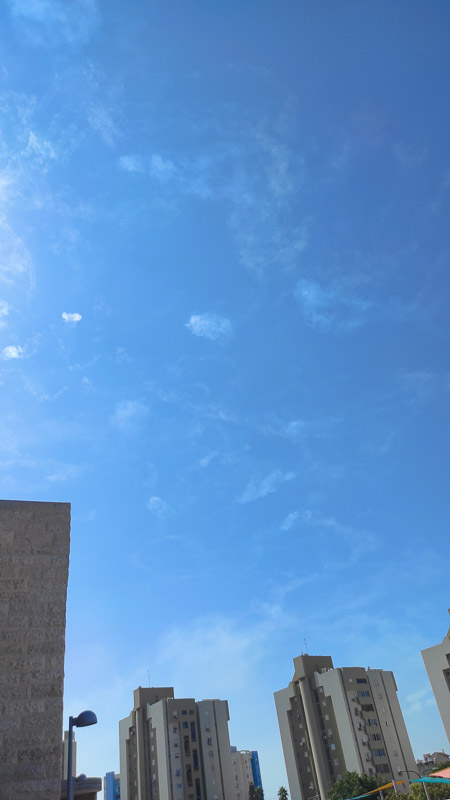
Friday and we need to prepare for Shabbat. We return to the hospital to man the tables. Barzilai is designed so that ambulances and vehicles can enter the Emergency Department area. there is protection on all sides, but only once you get into the lobby of the building. The hospital has operating rooms and wards beneath the surface of the earth and are protected against rocket attacks. The entrance area in front of the Emergency Department is set up with parking spots for ambulances, They can swing in one side, then exit the other side, after bringing the sick and wounded into the Emergency. This is where the tables that we man are positioned. Doctors, nurses and hospital staff run out for a quick sandwich, instead of going to the cafeteria. At the entrance area, there is an area where the press set up for interviews and wait for stories to present themselves. Occasionally a patient comes out and relates their story.
When a siren sounds, EVERYONE runs into the Emergency Department to take cover. Some wait the proscribed ten minutes, others just wait for the booms to stop an go back out.
There 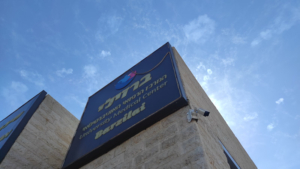 is a HUGE barrage from Gaza. It is followed by a second and third. Hamas claims to have shot 200 rockets at Ashkelon. Today’s barrages were especially bad, because they were one after another. I go outside and look at the sky. It is full of “clouds”, but when you look them, you see the remnants of interceptions of rockets by the Iron Dome missiles. If not for the Iron Dome, many Israelis would have been killed in each rocket attack.
is a HUGE barrage from Gaza. It is followed by a second and third. Hamas claims to have shot 200 rockets at Ashkelon. Today’s barrages were especially bad, because they were one after another. I go outside and look at the sky. It is full of “clouds”, but when you look them, you see the remnants of interceptions of rockets by the Iron Dome missiles. If not for the Iron Dome, many Israelis would have been killed in each rocket attack.
Day 6 — Thursday, October 12, 2023
Day 5 — Wednesday, October 11, 2023
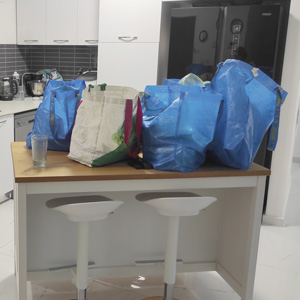 Intel has a huge factory in Kiryat Gat, which is about 20 minutes from Ashkelon. Whenever Intel builds a large and sophisticated plant, they use an American company to build it. They use foremen from the USA and the laborers are brought in from Ukraine and Russia. The foremen don’t want to live in Kiryat Gat near the plant, they prefer the beautiful seaside city of Ashkelon. Many live in the towers close to the sea, which is where many Anglos live. Some have joined our Anglo Community WhatsApp group and over time, we have gotten to know some of these people. These people are strangers in a strange land, not knowing the language, culture or the nuances between the various groups that seem to be in constant conflict with each other.
Intel has a huge factory in Kiryat Gat, which is about 20 minutes from Ashkelon. Whenever Intel builds a large and sophisticated plant, they use an American company to build it. They use foremen from the USA and the laborers are brought in from Ukraine and Russia. The foremen don’t want to live in Kiryat Gat near the plant, they prefer the beautiful seaside city of Ashkelon. Many live in the towers close to the sea, which is where many Anglos live. Some have joined our Anglo Community WhatsApp group and over time, we have gotten to know some of these people. These people are strangers in a strange land, not knowing the language, culture or the nuances between the various groups that seem to be in constant conflict with each other.
Mary is the wife of a construction foreman working on the new Intel plant in Kiryat Gat. She joined our WhatsApp group and immediately fit in, as if she were an Olah Chadash. On occasion she would use Google translate to translate messages so American could understand. She was not a stranger, she integrated herself into our worlds and we saw Mary as a fellow Israeli. So it was not a surprise when she contacted me, just after the War broke out.
“Hi Stephen, I hope this message finds you well. We have relocated up north for now and hope to be on a plane for the US tomorrow.
I’m wondering how things are in Ashkelon. We have a ton of food we would love to donate and there are things we didn’t bring with us that I’d like to get if possible. I feel like Israel is my home & I’m so sad to leave. My prayer is to return, hopefully sooner than later. S does not want me to go with him if he makes a quick run back to the apartment. I will message you and let you know if he does. We have lots of food and we want to make sure to share it during this time, and anything else we can think of. Prayers for all of you and all of Israel. Please stay safe.“I’m heartbroken that we were unable to return to Ashkelon and assist with the efforts there. We are scheduled on a rescue flight out of Israel today & praying for safe travels.
“Please extend our heartfelt concerns thoughts and prayers to our community. We hope to be back very soon. ❤”
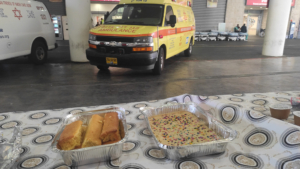 While waiting for her flight, she contacted me and told me to contact her landlord to let me in and take all of her food in the apartment and to give to those in need. Shulamit and I went over and retrieved all the usable food, and had to make several trip to the Mamad when there were attacks. We took almost her entire non-perishable food and have been using the food to prepare meals for the medical staff in the Emergency Department of the hospital. We found a few American cake mixes in the food that we retried from her apartment and one of the Anglos that remained in Ashkelon baked a few cakes and we brought them to the hospital. When staff came to grab some food during a break, and took her cakes, it created a kind of circle, from Mary, to the volunteer, to the doctor, to the patient.
While waiting for her flight, she contacted me and told me to contact her landlord to let me in and take all of her food in the apartment and to give to those in need. Shulamit and I went over and retrieved all the usable food, and had to make several trip to the Mamad when there were attacks. We took almost her entire non-perishable food and have been using the food to prepare meals for the medical staff in the Emergency Department of the hospital. We found a few American cake mixes in the food that we retried from her apartment and one of the Anglos that remained in Ashkelon baked a few cakes and we brought them to the hospital. When staff came to grab some food during a break, and took her cakes, it created a kind of circle, from Mary, to the volunteer, to the doctor, to the patient.
Alison picks us up and on the way home, she tells me that the park next to our building took a direct hit. A tree in our complex caught fire and the firefighters are called to put it out.
As the fire department extinguished the flames, journalists arrived.
Day 4 — Tuesday, October 10, 2023
The rocket barrage this morning is too close to home. The direct hit was was just outside our apartment complex and the rocket ignited a tree in a resident’s garden. The fire department is called to extinguish the flame. After that, experts come from the army to determine if there is any danger from the rocket. They see that there is nothing to do and leave.
Media start arriving, including a reporter from Belgium TV with his cameraman.
Hamas set a 5:00PM deadline for the evacuation of Ashkelon. We stayed.
Day 3 — Monday, October 9, 2023
 The bombardments are fierce and people are nervous. The Home Front Command issues a list of items that every home should have. The bare basics to get by for three days, It causes panic and people run out to supermarkets to pick up items from the list. A few days later they apologize and explain that this is a list that everyone should have on hand at all time. It is not just for war, but for earthquakes, storms etc.
The bombardments are fierce and people are nervous. The Home Front Command issues a list of items that every home should have. The bare basics to get by for three days, It causes panic and people run out to supermarkets to pick up items from the list. A few days later they apologize and explain that this is a list that everyone should have on hand at all time. It is not just for war, but for earthquakes, storms etc.
We heard that Ashkelon’s Barzilai Hospital needs food outside the Emergency Department. We go to a local supermarket. ALL the carts are gone. I get one from someone who is returning one. The store is in chaos. We fill our cart and wait in line. The lines are long and people are tense. The store is not designed to withstand a rocket blast, so everyone wants to get out and get home. While waiting in line, we hear a fight break out at the main cash. People yelling and screaming. A guy had taken a beer bottle and smashed it against something, breaking it and making it into a crude weapon. A woman in line near starts to shout at the top of her lungs: “Stop it, stop it. We are in a war. We are here because of “sinat chinum” (baseless hatred). She continues to yell until the shouting stops and the store became quiet. What she said must have stirred something in people, because it was more somber. This was like one of this dystopian movies where the town is invaded by aliens and the people have to buy food and get out of town.
We finally left the store and headed home. Alison organized a food prep with the items that we purchased at the supermarket.
Day 2 — Sunday, October 8, 2023
Images start to be seen of the atrocities and the kidnapped. Some of the Palestinian terrorists used Gopro type cameras to capture the carnage.
They were proud of what they did.
We are in shock.
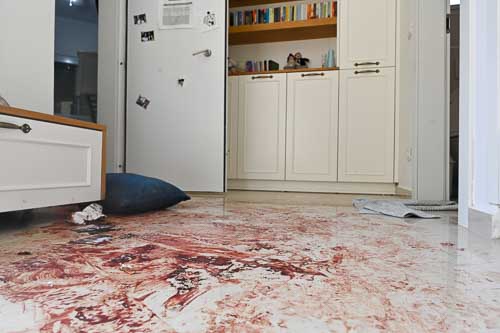
מלחמת חרבות ברזל
קיבוצים בעוטף עזה
קיבוץ נחל עוז
מחבלים ביום שבת שמיני עצרת חג סוכות
Photo by Kobi Gideon / GPO
Day 1 — Shabbat, October 7, 2023
We were soundly asleep until 6:30 AM when Alison’s phone starts to ding — again and again. The alerts keep on coming. Most Israelis have apps installed that warn us when there are alerts about rockets of terrorist infiltrations. Living close to Gaza, we choose to receive alerts about “secondary” areas. Sometimes, when rockets are launched at one area, another area might be attacked as well. The rockets are not guided, but since they are usually launched in clusters, some spill over to adjacent areas, informing us that more might follow. It is this crude early warning system that we use in order to tell us that getting into a shower or taking the dog out might be a good time.
We woke up the kids and told them we would probably hear a siren in our area of the city and will need to get into the Mamad right away.
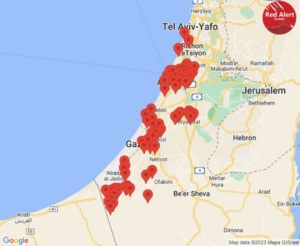 We live Ashkelon, which is 9 miles from the border with Gaza. We live in a complex of four buildings and when we were looking to move to Ashkelon, we fell in love with this apartment. The problem was that it did not have a Mamad (shelter) that is now required in all new construction of apartments. Our complex was built just after the Gulf War and the plans were already approved for construction. There are companies that strengthen an existing room in an apartment by building a steel box within the room and outfit it with a steel plate window and an approved heavy steel Mamad door. We have 30 seconds to get into our Mamad before the rocket strikes. If you live even closer to Gaza, you have 15 seconds. Places like Rehovot and Tel Aviv have 90 seconds, which to us in Ashkelon, feels like a luxury.
We live Ashkelon, which is 9 miles from the border with Gaza. We live in a complex of four buildings and when we were looking to move to Ashkelon, we fell in love with this apartment. The problem was that it did not have a Mamad (shelter) that is now required in all new construction of apartments. Our complex was built just after the Gulf War and the plans were already approved for construction. There are companies that strengthen an existing room in an apartment by building a steel box within the room and outfit it with a steel plate window and an approved heavy steel Mamad door. We have 30 seconds to get into our Mamad before the rocket strikes. If you live even closer to Gaza, you have 15 seconds. Places like Rehovot and Tel Aviv have 90 seconds, which to us in Ashkelon, feels like a luxury.
When we heard the siren for our area, we immediately dropped everything and rushed into the Mamad, closed and locked the door behind us. From the sheer number of sirens, we knew that we were going through a major attack.
We are a religious family, but when we are under attack, we have an obligation to fight back. B is part of a unit that is essential for fighting in Gaza. He called his commander who told him to go back home, get his gear and wait for his callup. N is three quarters way through her program in Intelligence and she did not need to call anyone, she knew immediately that she was needed back on base. Her boyfriend A, is in the same unit and called her to say that he was driving to Ashkelon to pick her up and take her back to base. H finished her service in the Navy a year ago and she also called her commander, who told her to be prepared for a callup to a base closer to the conflict.
As the hours started to pass, we started to read about what went on at the Nova Peace Festival, the breaches of the border, the kidnappings and the attacks on communities just south of us.
More sirens, back in the Mamad. Wait 10 minutes, then back into the living room where we would talk about our shock in how this was happening. A called to let us know that he is close. We suggest to H and B that they should go to Tel Aviv with A and N and get a bus to Jerusalem as transportation from Ashkelon might be difficult. They pack their things in minutes and Alison packs food for them all.
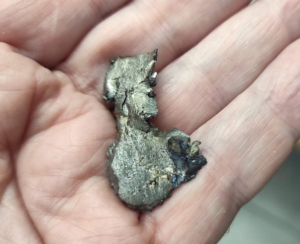
Shrapnel found on our Mirpeset
A comes in and tells us his account of getting to Ashkelon from his parent’s house on a Kibbutz in the Galil. Because the army did not know if there were terrorists making their way to Tel Aviv and other cities in the center, he had to pass through multiple roadblocks that were set up on the highways. A, who was not in uniform, pulled out a handful of ID cards from his pocket that he used to get past the checkpoints. There is a lull in the attacks, so we decided to sit on our Mirpeset (balcony) to get some air and see some sunlight. A sat down and immediately jumped up, because he felt something sharp on the chair. It was a piece of shrapnel. It might have come from an Iron Dome interception above our apartment or a piece of shrapnel that was shot from any number of rockets that hit in the neighborhood.
All four of the kids quickly left with tearful hugs and kisses from us. They are not kids; they are soldiers going to fight a war. Some in secret places, doing work we have no knowledge of, other are combat or combat support.
After Shabbat, we started hearing more details of the invasion, hostages, massacre at the peace festival. The more we heard, the more shocked we were. Everyone was asking how the powerful Israeli army did not stop this before it even happened.
These questions will have to wait for the commission of enquiry tat will probably be conducted after the war. In the meantime, we have to pull together to defeat Hamas.
More sirens, back in the Mamad. Wait 10 minutes, then back into the living room where we would talk about our shock in how this was happening. A called to let us know that he is close. We suggest to H and B that they should go to Tel Aviv with A and N and get a bus to Jerusalem as transportation from Ashkelon might be difficult. They pack their things in minutes and Alison packs food for them all.
Asaf comes in and sits down on a chair on our balcony.
Day minus 1 — Friday, October 6, 2023
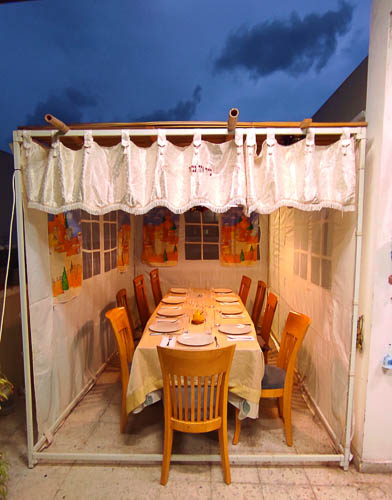 Our two daughters, N, and H, with her husband B, called us to tell us that they will be joining us for Shabbat / Simchat Torah. We were looking forward to the Shabbat, especially because H and B were married two months ago and three weeks after the wedding, they took an extended honeymoon to India. When young Israelis finish the army, many take a trip abroad to unwind and to consider what they will do after years of service. These trips are almost a rite of passage for post military Israelis. There are many destinations; South and Central America, Thailand, Australia and India. When they travel India, most follow the “hummus trail”.
Our two daughters, N, and H, with her husband B, called us to tell us that they will be joining us for Shabbat / Simchat Torah. We were looking forward to the Shabbat, especially because H and B were married two months ago and three weeks after the wedding, they took an extended honeymoon to India. When young Israelis finish the army, many take a trip abroad to unwind and to consider what they will do after years of service. These trips are almost a rite of passage for post military Israelis. There are many destinations; South and Central America, Thailand, Australia and India. When they travel India, most follow the “hummus trail”.
We took down our lovely Suka and Alison and I cooked up a storm. H and B had not had a great meal since they left. We made soup; eggrolls; potato cigars; and fried rice, which H especially likes; mushroom chicken; lamb patties; and shipudim. The table was set and we left to shul for the Simchat Torah davening and Hakafot.
For some reason, the Hakafot at our shul were especially lively, more so than in previous years. There were some teenagers from Ariel youth group with their shirts sporting their emblem. After the Hakafot we walked home and sat down to an amazing dinner.
We had a great discussion on H and B’s trip to India, their time spent with Chabad in different cities and their overall impressions of the country. N filled us in on her planned snowboarding and skiing trip to France and we filled the kids in with details about our planned trip to Spain.
We went to sleep around 10:00 pm, feeling great after catching up with the kids.
